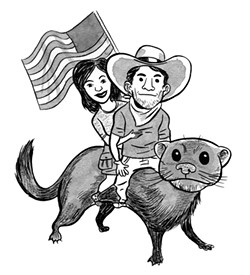San Francisco Weekly
By Jeremy LybargerWednesday, Aug 5 2015
On July 28, the FBI arrested Joseph Buddenberg and Nicole Kissane, two Oakland-based animal rights activists accused of releasing thousands of mink from fur farms during multiple cross-country sprees in 2013. The couple were also charged with vandalizing property owned by the meat and fur industries, including, allegedly, a meat distributor truck in San Francisco.
“To free animals from enslavement you have to break minor laws,” says Will Hazlitt, a press officer who disseminates communiques from underground animal rights groups such as Animal Liberation Front. “Calling this terrorism is ridiculous. Is cutting a fence terrorism?”
Yes — at least in the eyes of the U.S. government. Buddenberg and Kissane were indicted under the Animal Enterprise Terrorism Act, a law introduced by Republican Sen. James Inhofe and Democratic Sen. Diane Feinstein in 2006. The AETA prohibits people from engaging in activities “for the purpose of damaging or interfering with the operations of an animal enterprise.”
According to the Center for Constitutional Rights, the AETA also chills First Amendment rights such as picketing, boycotts, and undercover investigations if those actions “interfere with an animal enterprise by causing a loss of profits.” In the case of Buddenberg and Kissane, the FBI estimates the couple caused economic damages exceeding $100,000.
Hazlitt calls the AETA “unprecedented in scope” and compares it to ag-gag laws that penalize whistleblowers in the agriculture industry. “These people are political prisoners,” Hazlitt says of Buddenberg and Kissane. “And they’ve already been convicted by the media.”
Michael Whelan, Executive Director of Fur Commission USA, argues that Buddenberg and Kissane are extremists, not activists.
“They committed crimes in the name of their political agenda,” Whelan says. “These attacks devastated farmers and their families. Farmers were terrified. They were on high alert. That’s terrorism.”
Hazlitt is quick to point out that the organizations he’s affiliated with forbid harming humans. “And you can’t commit violence against an inanimate object,” he adds, thus demoting fence-cutting and vandalism to something less momentous than terrorism.
“Our office considers a diversity of tactics: Veganism, boycotts, protests,” Hazlitt says, “but this is about direct action as opposed to lobbying or writing your congressman. The ends justify the means when it comes to achieving our ultimate goal, which is to free animals from enslavement.”
Whelan counters that mink on fur farms aren’t enslaved. They’re raised from birth by farmers who’ve been in the business for generations, he says, and the animals are “well-fed, comfortable, and protected from the elements.” He calls Buddenberg and Kissane “young and idealistic,” but says their passion got the better of them.
“Look, I don’t like brussel sprouts,” Whelan says, “but I don’t have the right to go onto a brussel sprouts farm and dig them up.”


